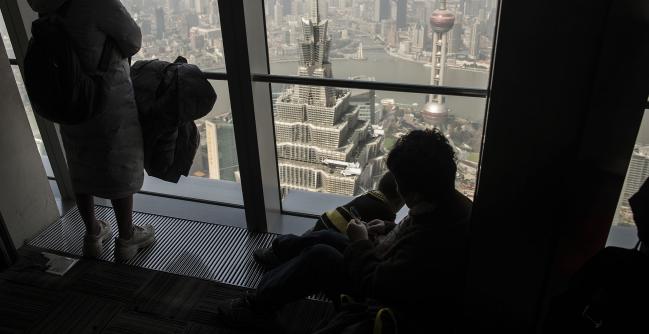 © Bloomberg. People look at the view from the observation deck at the Shanghai World Financial Center as the Jin Mao Tower, center, and the Oriental Pearl Tower, right, stand in Shanghai.
© Bloomberg. People look at the view from the observation deck at the Shanghai World Financial Center as the Jin Mao Tower, center, and the Oriental Pearl Tower, right, stand in Shanghai.(Bloomberg) — President Donald Trump expressed optimism the U.S. will be able to reach a deal with China that diffuses trade tensions between the world’s two biggest economies.
Trump said his administration will “probably” come to an agreement with China to resolve a dispute that has roiled financial markets and raised fears of a major economic conflict between the nations. The U.S. is considering tariffs on as much as $150 billion worth of Chinese imports, while China has vowed to respond with levies of its own on everything from U.S. soybeans to planes.
The president said on Monday it wouldn’t be “nice” of Beijing to target American agriculture in retaliation. “Our farmers are great patriots. They understand they’re doing this for the country,” he told reporters at a cabinet meeting. “‘We’ll make it up to them.”
U.S. stocks rallied on Monday as fears of a trade war subsided and investors looked ahead to the start of the first-quarter earnings season for companies. Goldman Sachs (NYSE:) chief economist Jan Hatzius said in a research note that the firm continues to expect the two countries to reach a compromise, and that the economic impact of the announced tariffs wouldn’t be dramatic.
Expectations are building the U.S. and China may be able to negotiate a settlement to their trade issues. Treasury Secretary Steven Mnuchin has been speaking to Chinese Vice Premier Liu He about trade issues, with the U.S. pressing for more access on autos and financial services.
But it remains unclear where the talks stand, and who’s leading them on either side. In an opinion piece in the Financial Times, White House trade adviser Peter Navarro accused China of breaking “every rule in the fair trade book,” and responding to the president’s trade actions with a “Great Wall of denial.”
China Is Said to Study Devaluation Amid U.S. Trade Spat
The appropriate response from China would be to change its behavior, said a White House official who spoke on condition of anonymity, adding the administration will use all available tools to protect American workers, farmers and ranchers. Trump ordered the tariffs after the U.S. Trade Representative’s office concluded China abuses American intellectual property and forces U.S. companies to transfer technology. The U.S. hasn’t said when the duties will take effect.
No Talks
A former senior Chinese diplomat suggested on Monday that Beijing wasn’t ready to hold talks. “As I understand, there is no plan whatsoever for talks,” said Ruan Zongze, now executive vice president at the Chinese Institute of International Studies. “China will fight.”
Some clarity may come Tuesday, when President Xi Jinping will give a speech at the Boao Forum For Asia, where he’s expected to lay out China’s approach to the trade dispute.
Trump also said the U.S. is close to negotiating an update to the North American Free Trade Agreement. “We are fairly close on Nafta and if we don’t make the right deal we’ll terminate Nafta and we’ll make the right deal after that,” the president said.
The White House has pushed to announce a renegotiated Nafta at the April 13-14 Summit of the Americas in Peru, which Trump will attend. But Trump said last week he had told his trade negotiators not to rush talks.
Mexican Economy Minister Ildefonso Guajardo said in an interview with Televisa, the country’s largest broadcaster, that he sees an 80 percent chance of an agreement by the first week of May.
Fusion Media or anyone involved with Fusion Media will not accept any liability for loss or damage as a result of reliance on the information including data, quotes, charts and buy/sell signals contained within this website. Please be fully informed regarding the risks and costs associated with trading the financial markets, it is one of the riskiest investment forms possible.
Source: Investing.com


























